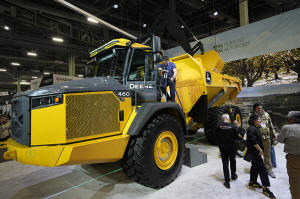Farming tech is on display at CES as companies showcase their green
innovations and initiatives
 Send a link to a friend
Send a link to a friend
 [January 10, 2025] By
RIO YAMAT [January 10, 2025] By
RIO YAMAT
LAS VEGAS (AP) — When Russell Maichel started growing almonds, walnuts
and pistachios in the 1980s, he didn't own a cellphone. Now, a fully
autonomous tractor drives through his expansive orchard, spraying
pesticides and fertilizer to protect the trees that have for decades
filled him with an immense sense of pride.
“The sustainability of doing things perfectly the first time makes a lot
of sense,” the first-generation farmer told The Associated Press at CES
2025, where John Deere unveiled a fleet of fully autonomous heavy
equipment, including the tractor Maichel has been testing on his
northern California farm.
Sustainability is a key theme this year at the annual tech trade show in
Las Vegas. From Volvo CEO Martin Lundstedt announcing their commitment
to net-zero emissions by 2040 to Wisconsin-based OshKosh Corporation
showing off its electric fire engines and garbage trucks, companies big
and small are showcasing their green innovations and initiatives.
“We absolutely need more climate-smart technologies,” said Jacqueline
Heard, CEO and co-founder of Enko Chem, which researches climate tech
solutions in agriculture — an industry Heard says is “under a lot of
pressure right now.”
That much is clear on the CES show floor, where farming is on full
display and company leaders are highlighting the impacts of climate
change and labor shortages on farmers.

Not far from John Deere's booth where autonomous tractors and dump
trucks are towering over conference attendees, Kubota, another equipment
manufacturing company, is showcasing its AI technology that detects
diseases in crops and sprays where pests have been identified.
Todd Stucke, president of Kubota Tractor Corporation, said AI is the
future of farming, especially with “summers getting longer and storms
getting stronger.”
Stucke himself grew up on a potato farm in Ohio. Each night after
dinner, his father would scour the field for bugs and then send Stucke
out to spray the crops with insecticides.
“We sprayed the whole field, but we might've only needed to spray a part
of the field or a plant,” he said. “Take that analogy into vineyards,
orchards and so forth, you don’t have to spray everything.”
[to top of second column] |

The Articulated Dump Truck is on display at the John Deere booth
during the CES tech show Tuesday, Jan. 7, 2025, in Las Vegas. (AP
Photo/John Locher)
 This is known as “precision
agriculture,” Heard said. “It allows farmers to really optimize
their land."
The idea, Heard said, is that farmers can expand the lifespan and
improve the quality of their crops while using fewer chemicals, like
pesticides and fertilizer.
“It's good for the environment. It's good for farmers," she said.
Heard said she wouldn't be surprised if AI can one day help farmers
map out their land, showing them the different soil types and what
kinds of crops would grow best there.
“It could be that with climate change, they should move to a crop
that's much more adapted to this new world," she said.
Back at the John Deere booth, Maichel, a tree nut farmer, said he's
hopeful that advancements in AI will help him better manage the
unpredictability of farming. Each year on his orchard is different
from the last.
“There’s no sliding scale, per se, that we have to deal with as far
as climate change goes,” he said. “We really bend to the climate
that we’re dealt with. It’s not something I can predict. It’s really
something we have to adapt to every growing season.”
If someone had told him just 10 years ago that a tractor would one
day be driving itself through his orchard, he said he wouldn't have
believed it. But now, he says, he sees how this evolving technology
can help him adapt to the changing industry and climate.
"We all need to eat, right?" Maichel said. “A farmer’s job is one
that we all need.”
___
Associated Press video journalist Patrick Aftoora-Orsagos
contributed to this report.
All contents © copyright 2024 Associated Press. All rights reserved
 |